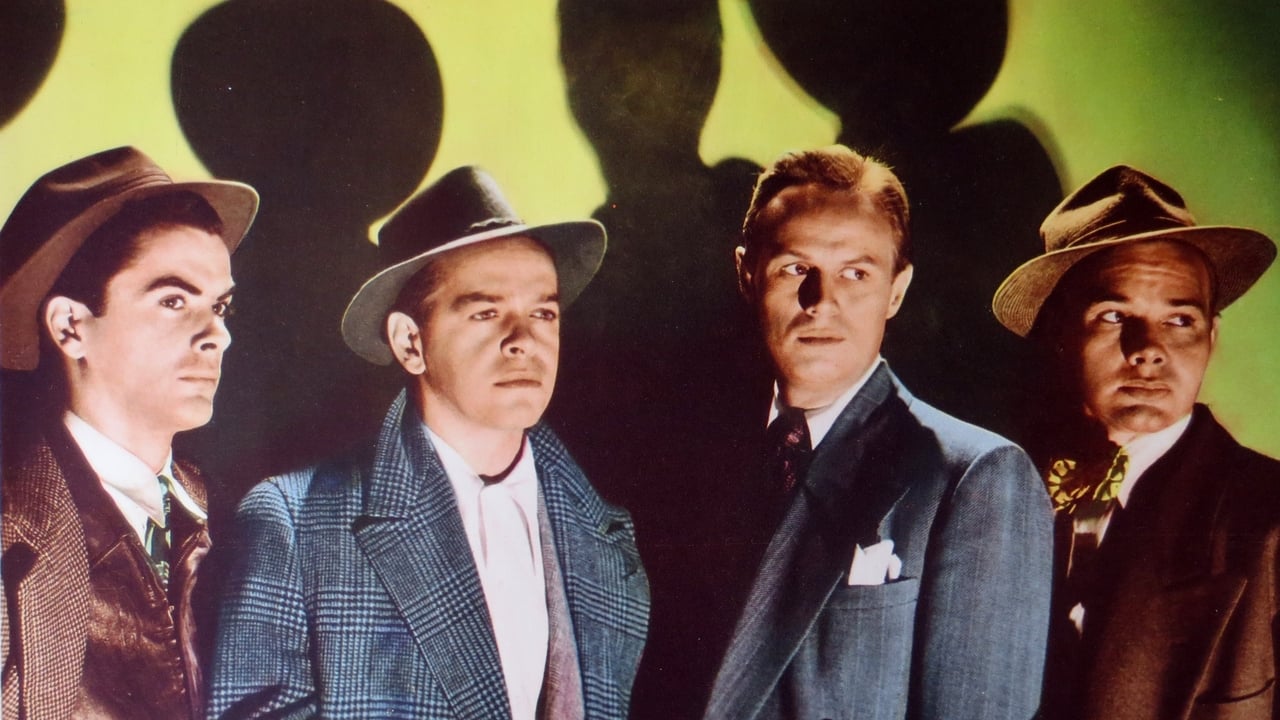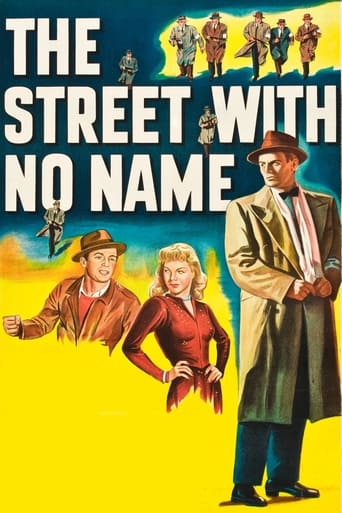Neive Bellamy
Excellent and certainly provocative... If nothing else, the film is a real conversation starter.
Aneesa Wardle
The story, direction, characters, and writing/dialogue is akin to taking a tranquilizer shot to the neck, but everything else was so well done.
Alistair Olson
After playing with our expectations, this turns out to be a very different sort of film.
Marva-nova
Amazing worth wacthing. So good. Biased but well made with many good points.
JohnHowardReid
NOTES: William Keighley, Best Director of 1948, for The Street With No Name. - Photoplay Magazine Gold Medal Ward.
Locations: Los Angeles, California; Washington, D.C.
Filming completed: 7 March 1948.
Re-made in 1955 as House of Bamboo.COMMENT: Semi-documentary adapted from actual FBI files, shot, wherever possible, in the actual locations and using as many as possible of the actual FBI personnel - so says the Foreword. Of course, when it is boiled down, very few members of the FBI are actually employed in the film, except in newsreel-like shots of the laboratory and fingerprint filing department. Louis DeRochemont didn't produce this one, so it seems likely that a great many of the dialogue scenes were lensed in the studio. One tell-tale evidence of this is the quality of the photography - immaculately smooth and polished with attractively glossy blacks and deep contrasts in what seem to be the studio scenes, whereas the photography is much more rough and ready in what are obviously actual location exteriors (the Center City streets, the ferry terminal). One exception is the climax in the factory (it certainly looks like an actual factory), which is beautifully photographed with noirish, deep-etched, atmospheric lighting. Another clue is that Keighley's direction tends to be more meticulous, more stylish and more polished than other Fox semi-documentary productions like Boomerang and House on 92nd Street.Yet another clue is that the script is more obviously an entertainment subject than a straight documentary recreation of actual events. Take the business of disguising the police informant for instance and then pointing a blatantly obvious finger at the police chief, glasses glinting evilly and face twitching with exaggerated nervousness, as he races off to make telephone calls at important points in the plot. What a cop-out when it is revealed he is not the person responsible and no attempt whatever is made to explain his previous odd behavior and irrational mannerisms!While Reed Hadley still handles the narration, the film is only a semi-documentary on the surface. But who cares? Two thrilling action scenes will thrill the fans, and Widmark's followers will not be disappointed.
Alex da Silva
Gene (Mark Stevens) infiltrates a gang led by Alec (Richard Widmark) with the intention of discovering who is responsible for a series of recent shootings and robberies. Gene makes his reports to Inspector Briggs (Lloyd Nolan) and has an undercover contact to help him, Cy (John McIntire). However, Alec suspects that one of his gang is betraying him and he then gets a phone call which confirms things to him....This is a boys film about gangsters. The only woman with any kind of role - Judy (Barbara Lawrence) appears briefly and gets slapped about - I'm not sure her role has any relevance. The story is good and both the main characters, Mark Stevens and Richard Widmark, play their roles convincingly. A slight irritation is the narrator at the beginning - I wished he would just shut up and let the film take its course. Similarly, there are a few overlong sequences of police checking but overall it's a good film. However, it would have all ended differently were it not for an unsung hero, a cab driver (Charles Tannen).
GManfred
Oh, alright. After much deliberation I rated this picture a 7, but I almost gave it a 6. Hard to tell 60-odd years later if it was an 'A' or was a second-billed 'B'. It had some 'A' moments but not really enough of them, and the cast was a 'B' cast, with Lloyd Nolan, Richard Widmark and Mark Stevens. Speaking for myself, I never could warm up to Stevens and always found him pleasant but colorless. He lacked charisma, and here he is the lead character which I felt dragged the picture down to a 6.No other complaints. It moves along fairly well but could have been punched up with a little more action. An interesting little movie, all in all, particularly some FBI techniques (which are probably outdated by now), and I always enjoy watching guys in suits and fedoras.Before closing, can I share a secret with you? Richard Widmark plays the baddie but I never found him particularly threatening. Small and fair-haired, he was still living off his psychotic role in "Kiss of Death" which at this point was two pictures ago. Always thought he looked too much like a good guy. Now, take Raymond Burr - THERE was a bad guy.
secondtake
The Street with No Name (1948)Lloyd Nolan appears as George Briggs, FBI agent (exactly as he did in Henry Hathaway's 1945 House on 92nd Street), and again, we see the FBI steadfastly solve a crime. This time it isn't that largest of themes, the atom bomb, but a more routine and gripping one, robbery and murder. Short parts of the film are basic FBI training dramatizations (well done, but a little undramatic), and there is sometimes the inevitable omniscient narrator, a little heavyhanded, but the rest of the film cooks along really well. Watch for some great noir scenes, including an edgy shootout in a factory.Most interesting is the presence of Richard Widmark (in his second film after after Hathaway's Kiss of Death). He is an interesting addition to any movie, from snarling bad guy in Kiss to navy officer in The Bedford Incident. The plot moves at a good clip, and the mayhem compounds as the FBI gradually builds leads (and uses its huge resources), and then the straight drama gets going, and the movie takes off. There are some great night shots, and once the lead agents get out on their own in the layered jazz of the city, it gets edgy and pretty exciting. It never becomes something completely self-sustaining and special, however, due to the need to explain the FBI's tireless and all too flawless efforts.Director William Keighley had an uneven career, but some high points including the legendary Robin Hood of 1938. Street with No Name pulls together a lot of great scenes, from sleazy hotel rooms to a boxing gym. I enjoyed this a lot more than the seemingly similar (in budget and intent) House on 92nd Street (also 20th Century Fox). You'll notice that there is a lot of trading and overlap of talent in these Fox films, and these are basically B- movies that have the hook of actual FBI promotion built in. Efficient stuff, made for a quick appearance and some short term money (the directors knew these were not classics). Because we know the FBI will steadfastly succeed, a certain suspense is removed. But maybe that's comparing it to classics like Fox's Kiss of Death, which isn't fair. The Street with No Name is sometimes dazzling, and definitely a qualified pleasure.

